What Is a Plant-Based Diet?
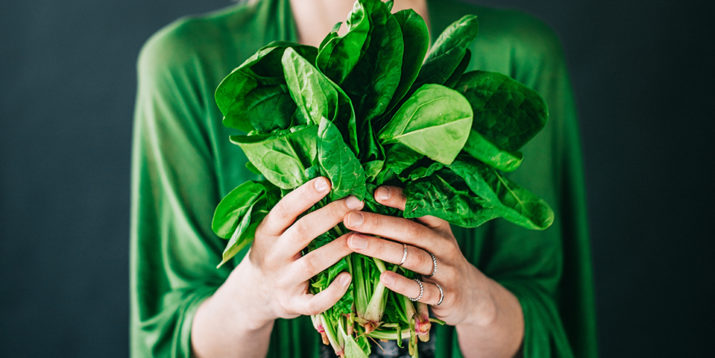
If you’ve ever Googled “what is a plant-based diet vs. vegan” and came away more confused than when you started, you’re not alone.
Who knew there were 100+ million “answers” to that question?!
The answer is simple… kind of.
(Note: We’re using the term “diet” throughout this article to describe a way of eating, not a regimen to lose weight.)
So, what is a plant-based diet? And what is a plant-based diet vs. vegan? Vegetarian vs. vegan? And what’s a whole-food plant-based diet?!
All excellent questions, but first, let’s talk about the term “plant-based diet.”
Rather than describing a specific pattern of eating, like veganism, it’s more of a general umbrella term that covers different types of diets that emphasize eating mainly plants.
“In the nutrition world, we refer to a plant-based diet as a diet that can include a few animal foods,” says Krista Maguire, R.D., C.S.S.D.
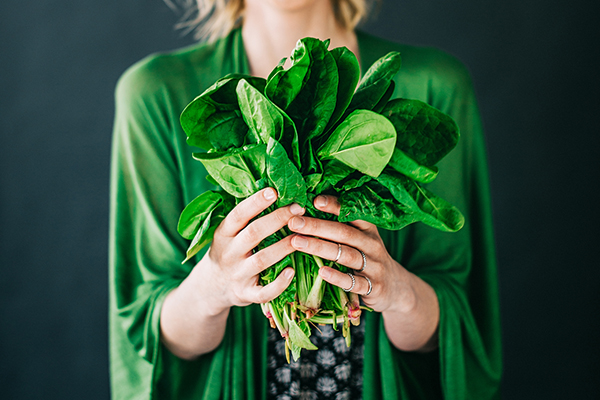
What Is a Plant-Based Diet vs. Vegan?
The answer to this question isn’t quite so simple, mainly because it’s not really an apples-to-apples comparison.
One way of looking at how a plant-based diet, vegan diet, vegetarian diet, and others relate to each other is to think of them in terms of the physical structure of a plant:
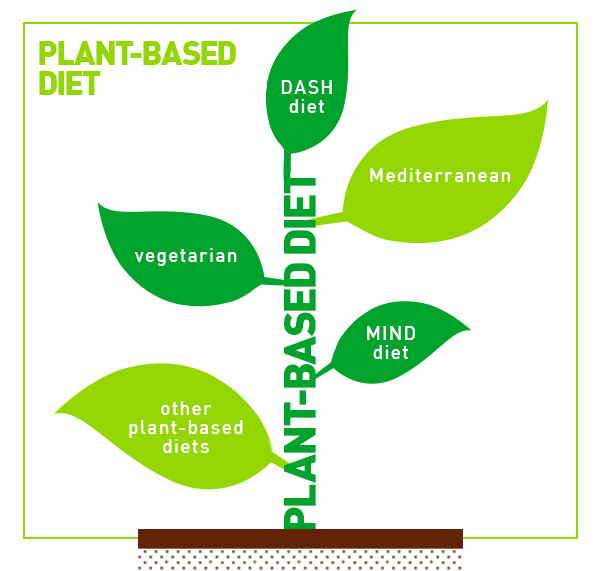
A plant-based diet is the main “stem.”
Branching off that stem are “leaves” that are variations of a plant-based diet: vegetarian, Mediterranean, DASH, MIND, among others.
Depending on how far down the rabbit hole you want to go, the vegetarian diet has several of its own variations, one of which is the vegan diet.
Here are some of the most common vegetarian diets:
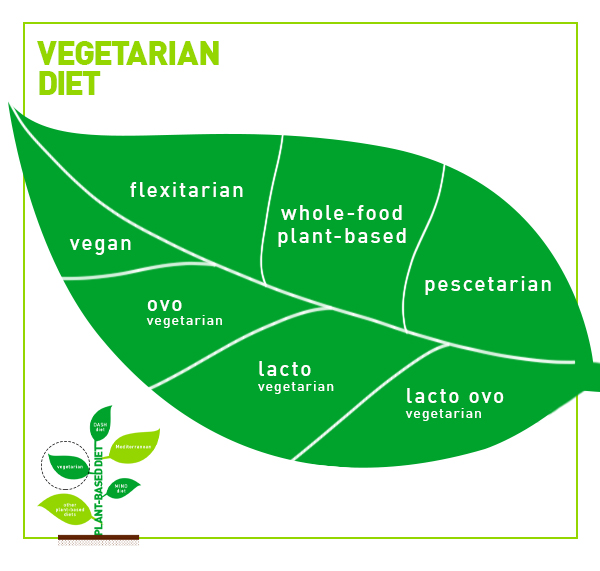
Lacto Vegetarian: Mainly plant-based, consumes dairy, no eggs.
Ovo Vegetarian: Mainly plant-based, consumes eggs, no dairy.
Lacto-Ovo Vegetarian: Mainly plant-based, consumes dairy and eggs.
Pescatarian: Mainly plant-based, consumes seafood and fish.
Flexitarian: Mainly plant-based, can consume dairy and eggs; consumes meat and other animal foods on occasion.
Vegan: 100-percent plant-based, no animal protein, no animal-derived foods. Usually, no honey or white sugar either because it is sometimes processed using bone char.
Many vegans consider veganism a lifestyle, too, so no animal-derived products like leather, wool, and silk.
It’s worth noting, however, that potato chips, Jolly Ranchers, and Fritos are all technically “vegan,” so just because a food is vegan doesn’t automatically make it healthy.
Whole-food, plant-based diet (WFPB): 100-percent plant-based, no animal foods, no oil, no added sugars.
The 21 Day Fix vegan plan is closer to a WFPB diet in that it excludes most processed foods; however, the macronutrient ratios differ.
The plan is roughly 50 percent carbs to 25 percent each fats and proteins, which is great for either weight loss or maintaining your current healthy lifestyle while allowing for occasional treats.
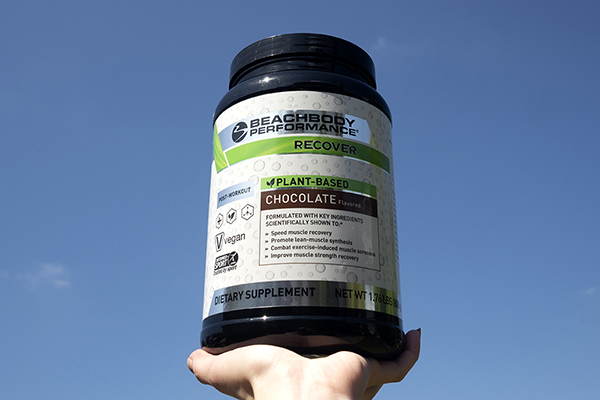
Plant-Based, Vegan Supplements
People who eat plant-based and vegan can also consume nutritional supplements like Plant-Based Chocolate Recover, our post-workout drink, and Plant-Based Shakeology, our nutrient-dense superfood protein shake.
Plant-Based Chocolate Recover is 100-percent vegan, with 20 grams of pea protein along with the BCAAs and pomegranate extract found in the original formula.
All the Plant-Based Shakeology flavors are 100-percent vegan and contain a blend of plant-based proteins from pea, flax, rice, and quinoa and that deliver all nine essential amino acids.
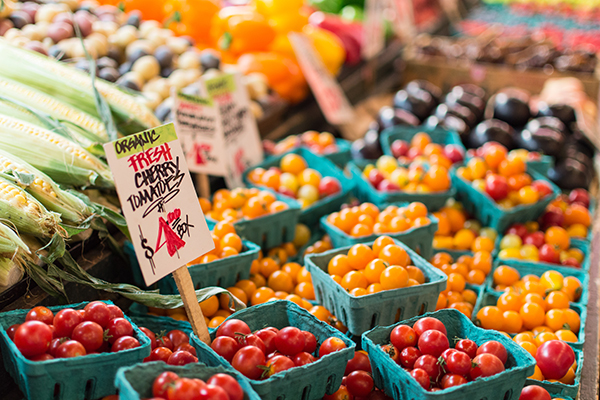
It’s All In a Name
Back in the not-too-distant past, “vegan” foods were usually only found at health food stores or specialty food stores.
These days, vegan foods and products can be found in the aisles of almost any chain grocery store.
But for some people, seeing “vegan” on a label may still feel off-putting or exclusionary.
Food manufacturers are catching on — you’ve probably noticed the phrase “plant-based” appearing on more and more food labels.
“Surveys have shown that the term [vegan] can be alienating, and if you call something vegan, non-vegans can think it’s not for them,” explains Bruce Friedrich, executive director of the Good Food Institute, a Washington, D.C.-based group that develops and markets plant-based alternatives to animal foods.
“I want people to eat more plant-based food, and if calling it ‘plant-based’ instead of ‘vegan’ will help, then that’s what I’ll do,” he says.
“Plant-based diets are associated with better health outcomes overall. So the more whole plant foods we can incorporate into our diets the better off we’ll be in terms of our health,” says Andrea N. Giancoli, M.P.H., R.D.
Fun Plant-Based Fact: “Plant-based” is a term coined in the 1970s by nutritional biochemist T. Colin Campbell, Ph.D., co-author of “The China Study,” which is based on his comprehensive study on the health effects of a plant-based diet vs. an animal-based diet.
The Bottom Line
With all of this said, there’s no rule that says you have to label your eating style anything.
Maybe your ideal plant-based diet is one of the diets mentioned above; maybe it’s a mix of one or more.
Or maybe it’s something completely unique that throws all those labels out the window.
At the end of the day, the important thing is to find a healthy way of eating that you’ll stick with in the long term, one that works for your lifestyle and your health goals.
Looking for more expert nutrition information? Head over to BODNutrition.com and learn how to eat healthy with the help of our two nutrition programs, 2B Mindset and Portion Fix.
